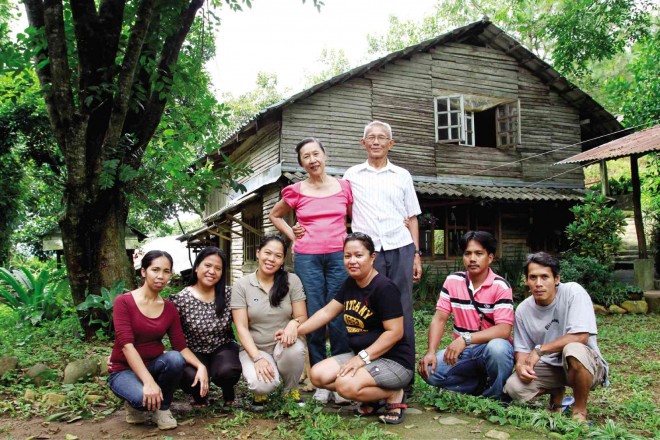Sierra Madre hero-makers gave haven to abuse victims

CHAMPIONS OF THE DUMAGAT Boots and Joseph Asanza with their former students and now trainers (seated, from left) Jane Rosas, Ella Tamana, Liway Arceo-Pablo, Celia Jataas, Allan Tamana and Jun Rosas at their place along Marcos Highway in Tanay, Rizal EDWIN BACASMAS
TANAY, Rizal—During an outreach in the Sierra Madre highlands, Boots Asanza met a Dumagat who was struggling to say his name. The voice of the Dumagat had been taken away from them, she thought.
“[F]or four hours, we waited for him to introduce himself so he could recover his voice,” Asanza said.
Asanza, together with her husband, Joseph, put up an alternative school in Tanay town, Rizal province, in 1995 to train health workers and then send them to tribal villages in the Sierra Madre mountains.
Tanay has 20 villages, half of them located in the highlands inhabited by Dumagat.
For their humility about their work, the Asanzas were nominated by Lt. Gen. Loven Abadia, former chief of the Philippine Air Force, to “Heroes ’R Us,” the Inquirer’s search for everyday heroes that ran from Aug. 15 to Aug. 21.
Article continues after this advertisementApart from developing health workers, the school served as a center for community services and victims of rape, incest and domestic abuse went there for shelter.
Article continues after this advertisementThe school was later called “Kanlungan” because it served as a haven for women, youth and indigenous people.
When the indigenous people could not leave their villages, the Asanzas and their students went up to the mountains to reach them despite the danger of running into fugitives and insurgents or being mistaken for communist rebels.
Self-confidence
The school’s impact on the community was best expressed by Jun Rosas, a graduate of the school. He said the people, especially the indigenous and the marginalized, developed self-confidence and were empowered to defend themselves.
Asanza described the results of their efforts by narrating the experience of one of her students who once had lunch with two Dumagat children. The children were eating just rice and shrimp paste, but were very proud to eat their food because, the student learned, it was they who planted and harvested the rice.
“The student was touched because when she was a kid she would have rice and shrimp paste for lunch and she would feel deprived whereas these two indigenous children were eating the same thing with joy in their faces,” she said.
Asanza, 74, taught at the University of the East (UE) Ramon Magsaysay Memorial Medical Center, where she finished her medical education, specializing in pediatric neurology.
Alternative school
Aiming to reform the curriculum to make it more community-oriented, Asanza proposed an alternative school to Panfilo O. “PO” Domingo, then chair of UE (now deceased).
Her plan was approved and the school became an affiliate of UE. This meant that her students, who were training in community health, would graduate with a UE diploma.
Celia Jataas, a graduate of the school, is now with the Department of Social Welfare and Development (DSWD), working with homeless street families.
Another graduate, Ella Tamana, is now a teacher at nearby Tablon Elementary School while her husband, Allan, also a graduate of the school, is also working for the DSWD.
“I’m a hero-maker and my husband is the wind beneath my wings,” Asanza said.
The couple celebrated 50 years of marriage in December last year.
The protector
Asanza met her husband, a retired Air Force colonel, in Baguio City when he was still a cadet at the Philippine Military Academy (PMA). Her cousin also attended the PMA, and cadets, including Joseph, were frequent guests in her aunt’s house, where she spent summer vacations.
Joseph didn’t talk much but Boots said he supported her work in various ways.
“He was really a Joseph, our guard and our protector,” she said, noting how he would drive the van whenever she and her students would go up to the mountain, wait for hours until they come down and make sure they come back safely.
One time, his presence at a court hearing in a rape case proved enough to stop attempts to intimidate the victim, who was taking shelter in the school, she added.
“I believe in what they were doing and whatever they need I was there to support,” Joseph, 79, said.
For 15 years, the couple succeeded in creating a safe place for young people and women through their school.
But they had to cease operations a few years ago because of their advanced age and lack of funds, Asanza said.
Service continues
Their selfless service continues, though.
“I am old. I don’t have the energy anymore but I feel that I still have a couple more years. What should we do next?” Asanza said.
She seemed to have found the answer after attending a recent village meeting that discussed how to make the village child-friendly.
“We are going to help others do the work. The solution is not to give me money so we can repeat everything that we have done before. The important thing is to have renewed energy and to condense everything we learned so that we can participate in government,” Asanza said.
RELATED STORIES
Sierra Madre clashes hurting Agta tribesmen
Wanted: Benevolent hearts for Agta scholars of Sierra Madre
‘Nobody ever notices’ they keep the village peace